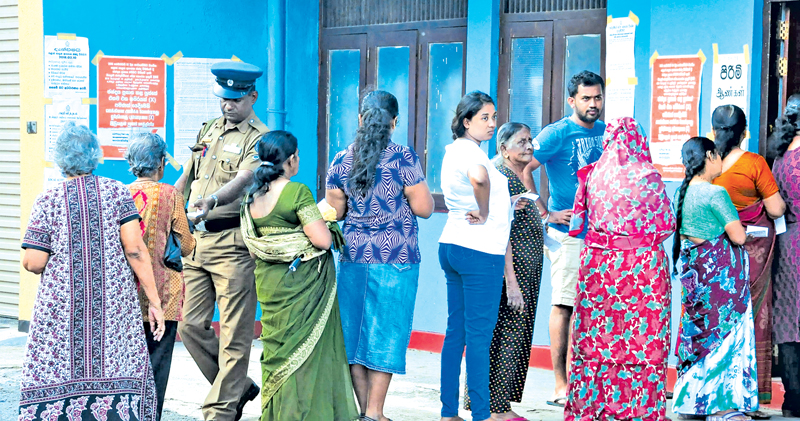The essence of any democratic country is the healthy functioning of ethical political parties and free and fair elections. To conduct free and fair elections, a country should possess a solid legal framework and a transparent electoral process. And, to acquire a transparent electoral process a country needs an institutional structure regulating campaign finance. This is the only way to adequately ensure that governance caters to the welfare of general public and not for special interests.
The recent disclosureby New York Times on China Harbour Engineering Company Limited funding immediate past President’s election campaign has proven beyond doubt that it’s time to seriously consider the introduction of stringent regulation of election campaign finance in Sri Lanka.
Dimensions
Election campaign finance reforms advocate a simultaneous pursuit of transparency (limiting and capping of political donation whether cash or others) and deter cronyism (making disclosure mandatory).
Both dimensions are inter-connected to each other. However, some observers think that due to the prevailing corrupted political culture, it is only an independent body like Election Commission with a given set of clear laws and regulations can deliver the expected aspirations.
Corruption
For three decades since Independence, Sri Lanka had been a model for emerging democracies across the world. Having held periodic elections since 1947, the effectiveness of the electoral structures both at the national and state-levels has to a great extent defined our success as a modern democratic nation.
Unfortunately, over the past four decades, the essence of democracy has been continuously corroded by corruption in the electoral financing structure, criminalisation of politics and lack of genuine inner-party democracy. If the present government wants to reform the process, it is essential that the all-pervasive influence of illegal sources of money on the political culture must be addressed.
Of course, it is common knowledge universally that during an election, candidates and political parties require funds to promote themselves and their vision of governance. The general presumption is that access to greater funds would translate into a more beneficial electoral outcome, since they would have access to greater number of voters.
However, there can be some negative externalities associated with the process of seeking more funds. First, those who are already in a position to exert influence due to their political standing can pressurise businessmen and other sources for funds. Second, powerful private sources might work out an arrangement of quid pro quo with the candidate, which would result in elected candidates taking decisions for the welfare of special interests. Thirdly, this broad framework throws light on the conceptual problems associated with the process of democratic elections. Therefore, the need to regulate political finance flows from minimising such possibilities.
Political equality
Of the various ways in which citizens in Sri Lanka can be unequal, political inequality is one of the most significant and troubling. By political equality we refer to the extent to which citizens have an equal voice over governmental decisions.
Political equality is an essential feature of modern political discourse. Although the definition of this concept can be diverse, political equality is generally understood as a condition where “control over governance decisions so that preferences of a special group of citizens are not weighed more heavily than the preferences of other groups of citizens.
When there is no effective regulation of political campaign financing, it will result in adoption of policies that disproportionately favour the electoral contributors at the cost of public welfare. Therefore, there is a visible linkage between degradation of political equality and the way political campaigns are funded.
In this sense, it is reasonable for a common citizen to feel that our current electoral laws have been unable to safeguard political equality and to preserve the fundamental idea of democracy of a vote being the voter’s proxy for participation in governance.
Loopholes
It’s time, therefore the Government take a long hard look at Sri Lanka’s election campaign financing structure and methodology. First of all, it is prudent to address transparency by squeezing out channels of cash donations and ensuring that only accounted clean money enters the political arena through banks.
A cap on donations, is also a must, although it has become a controversial issue in a number of countries. Some countries have a cap of different figures, depending on what type of election it is (local, provincial or national). However, disclosure requirement is a progressive step and it becomes all the more so since auditing disclosure statements have proven to be politically and administratively feasible.
Spending limits on campaign can also be introduced. These exist in, many Asian countries such as Bangladesh, and Thailand. To be really effective, spending limits need to be enforced on parties as well as candidates, so that money cannot be back-channelled to one via the other. Similar loopholes can be closed by making both candidates and parties responsible for adhering to spending limits, anonymous donation bans and reporting requirements.
Apart from legal changes, Election Commission, as the oversight authority, could be further strengthened to deal effectively with any high amount of unreported money.
Since enforcement starts with transparency, it may be a good idea to make party expenditure information available online. But Election Commission should also find ways to go beyond information gathering and apply sanctions more rigorously.
Political parties themselves need to consider less expensive campaigning. By raising large numbers of small donations, parties will not only become less dependent on a few large donors but also broaden their popular support. They also can use pocket meetings and social media. All three techniques have already been successfully tried on a smaller scale in India and Indonesia.



Add new comment